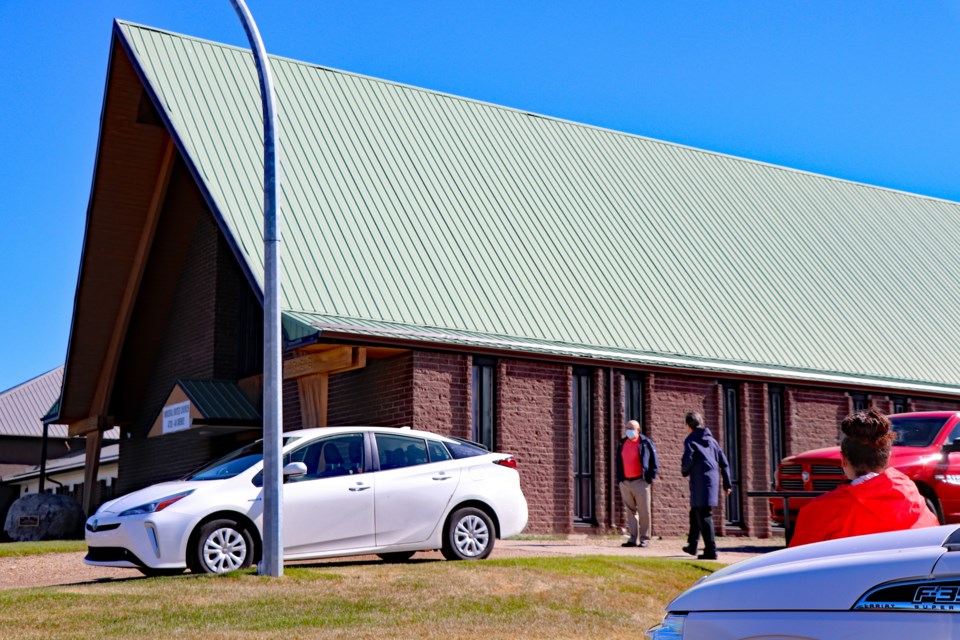INNISFAIL – The bells rang 215 times in Innisfail last weekend for Kamloops' forgotten Indigenous children.
At 10:15 a.m. on Sunday, June 6, about 20 congregation members at the Innisfail United Church paused inside, along with others outside with non-congregation citizens, to take solemn notice for five minutes of the tragic and shocking discovery of 215 undocumented graves on the grounds of the now closed residential school in Kamloops, B.C.
“I am here to remember a tragic time in Canada’s history,” said Joy Milne, a member of the church, who stood outside with her five-year-old son Magni during the bell ringing.
Milne said she was “devastated” when she first heard the news of the discovered graves.
“I am mother. I can’t imagine having my kids taken away. We have to have conversations. We can’t let things like this be forgotten," she said.
The church’s Rev. Darren Liepold said the gesture to ring the bells 215 times was to recognize that Canada has a long way to go in terms of how the country treats its Indigenous citizens.
The bell ringing was also inspired by both the reaction of congregation members and the community at large to the horror of the Kamloops discovery, he said.
“Personally, I am a Metis citizen myself, so I did feel this quite dramatically but I do know the congregation felt very angered, upset and all of those things and wanted to express in some way its solidarity,” said Liepold.
“And recognizing that the system that was in place with residential schools is still somewhat in place with foster care and the high rates of incarceration for aboriginal people. This is a way of recognizing we still have a long way to go as a country to make things right."
“And to think that denominations, including the United Church played a role in residential schools, really does bother them,” he added.
“We know we still have a lot to apologize for the misdeeds that happened at our schools and we hope that other denominations would take responsibility for what happened there.”
Coun. Jean Barclay attended the local United Church bell ringing tribute and called it a “moving” service, adding many citizens do not know enough about Canada’s history.
“I know I don’t, and that is on me and not anybody else. It’s time we learned about cultural genocide in this country,” said Barclay. “I am very grateful the United Church chose to honour these children and we will see what happens going forward. It won’t be the last discovery I am afraid.”
The Catholic Church ran about 60 per cent of residential schools in Canada. The Anglican Church was next with about 25 per cent, with the United Church operating the remainder, about 15 between 1849 and 1969.
In 1986, during the United Church of Canada’s 31st General Council, the church apologized to Canada’s Indigenous peoples for its part in colonization, and then on Oct. 27, 1998, apologized for its role in the residential school system.
Between 1820 and 1969, the Anglican Church operated three dozen residential schools. In 1993, the Anglican Church apologized to survivors for physical, emotional and sexual abuses, and then in 2019, apologized for spiritual harm.
The Catholic church has yet to officially apologize to the country’s Indigenous peoples for its predominant role in Canada’s residential school system.
Last weekend speaking from St. Peter’s Square, Pope Francis called for healing but did not issue an apology.
"The sad discovery further raises awareness of the pains and sufferings of the past. May the political and religious authorities of Canada continue to collaborate with determination to shed light on that sad story and humbly commit themselves to a path of reconciliation and healing," said the Pope.
"These difficult moments represent a strong appeal for all of us, to move away from the colonizing model and also from the ideological colonization of today, and walk side by side in dialogue, in mutual respect and in the recognition of the rights and cultural values of all daughters and sons of Canada."
Read more from MountainViewToday.ca



